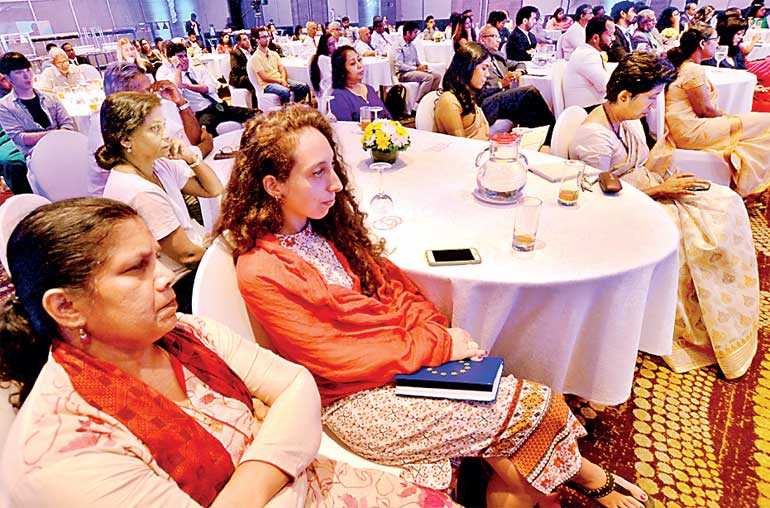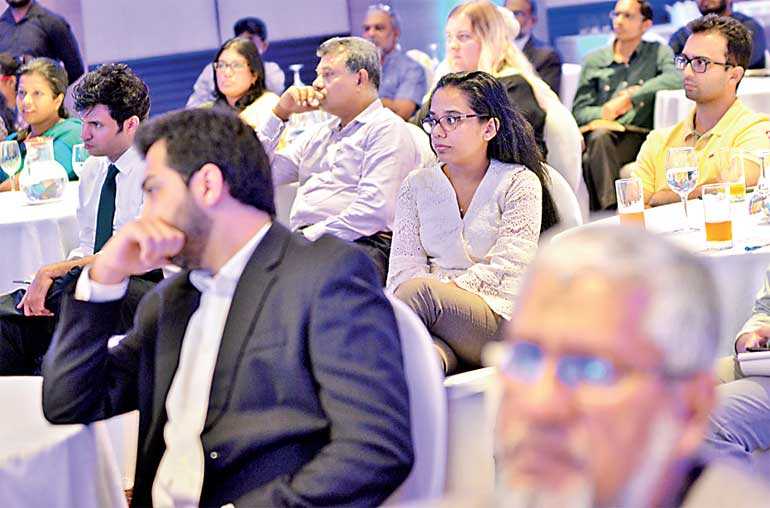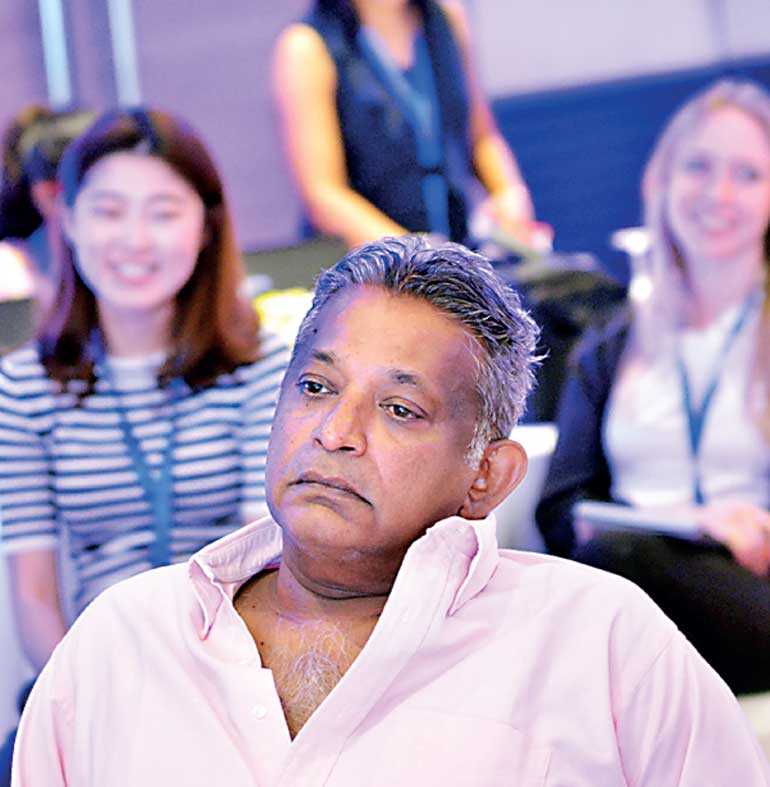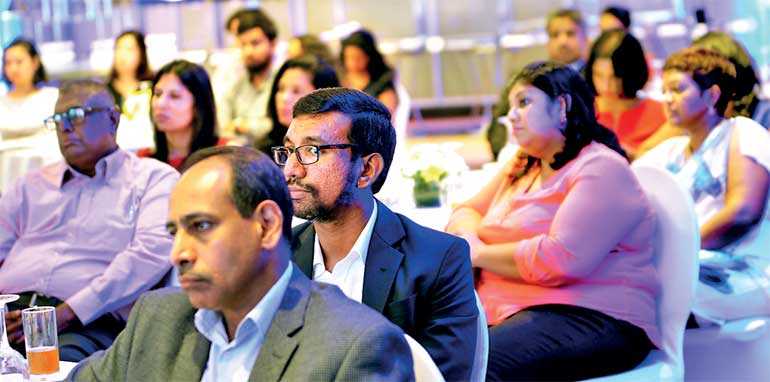Tuesday Feb 24, 2026
Tuesday Feb 24, 2026
Friday, 12 April 2019 00:00 - - {{hitsCtrl.values.hits}}

By Shanika Sriyananda
An independent UK-based researcher said that asylum seeking or inward migration for employment was not a major issue in Sri Lanka at present but it could create a problem in future as the post-war economy had opened up more job opportunities in Sri Lanka.
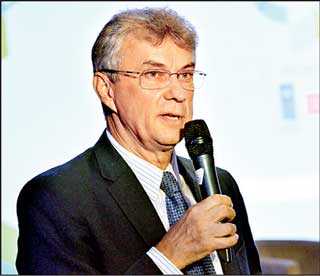 |
UNDP Sri Lanka Resident Representative Jorn Sorensen |
Consultant and Senior Research Fellow of the Institute of Commonwealth Studies in London Christopher Smith expressed his views about the impact of migration, particularly professional labour into Sri Lanka and vulnerability of more asylum seekers coming into the country, in future.
“Migrants do not come to the UK to take away British people’s jobs but they come there to work in areas where there are labour shortages. Asylum seekers are not all on false claims and those who did so are a minority,” he said at the recently-held discussion of the Colombo Development Dialogues organised to discuss the woes of asylum seekers and refugees in Sri Lanka and the remedial measures to address them.
Globally, the gap between humanitarian funding and the needs of refugees and asylum-seekers is widening, despite refugee situations increasing in scope, scale and complexity, and requiring holistic and humane solutions and support. There is also increasing recognition of the developmental, social, political and economic challenges faced by host countries with refugee situations.
The 1951 Convention on the Status of Refugees and its 1967 Protocol features fundamental principles of non-discrimination, non-penalisation and non-refoulement, as well as minimum standards pertaining to the treatment of refugees, which Sri Lanka is yet to accede to.
In December 2018, Sri Lanka expressed its desire to abide by the commitments stipulated in the recently-adopted Global Compact on Refugees, which includes ensuring the right to employment and the right to education. The Government provides asylum space until solutions are found, with UNHCR processing asylum claims, the process of which can take up to two years.
At present, a little over half of such individuals in Sri Lanka have been granted refugee status, while the rest remain asylum seekers. Such refugees and asylum seekers, who are primarily of Pakistani and Afghan origin and are under the age of 45, are not supported by a legal framework for employment. UNHCR provides a minimum monthly subsistence allowance to recognised refugees to pay for basic needs; asylum seekers are not provided this allowance.
As such, self-reliance is difficult to achieve, which not only affects psycho-social and physical well-being, but also family structures within refugee communities. Refugee and asylum seeker children also do not have official access to education, and refugee children are provided primary school education by UNHCR.
The objective of holding the Dialogue was create a forum to discuss and share how all relevant stakeholders can work together, in terms of ensuring basic standards of living while adhering to international commitments, while balancing the challenges refugee situations can introduce.
Smith, who has experience in the UK working in British Courts for asylum seekers, primarily those who are from Sri Lanka and other countries, explaining how migration will affect Sri Lanka, said: “This is going to be an issue which needs to be balanced on labour coming in and labour going out. There would be opportunities for work for foreigners. They are also depending on regional dynamics because much of the asylum seekers to Sri Lanka come from South Asia. The UK gets thousands of thousands of asylum seekers every year particularly from countries like Pakistan and Syria. In global standards Sri Lanka is going to be a minor player,” he opined.
Access to education
He explained the importance of giving access to education and employment for asylum seekers and refugee community in Sri Lanka, the structural limitation for providing more opportunities for them and the role of the Government for collaborations.
“Sri Lanka is engaged with international partners in multilateral and bilateral relationships to make the process of seeking asylum smoother. Another fact that I wanted to mention here is that lots of asylum seekers have arrived in their host countries with great potential. There are professionals, journalists, doctors, lawyers and other professionals but for some reasons very few of them are engaged in their professions in their host countries. What does this mean? There is an enormous waste of human potential as most of them are ended up working as taxi drivers and in supermarkets even after their refugee status has been granted,” he claimed.
He said that they needed to get access to education despite their country of origin or their gender as education meant getting access to language skills and it was the key to integration.
“If they do not come into integration and remain outside, asylum seekers will be problematic and this required some interventions by the State for them to survive and prosper. We are simply doing nothing after we grant them refugee status. A dialogue is needed within Sri Lanka in this regard as there will be a rise in asylum seekers in future and Sri Lanka needs to be ready for it,” Smith stressed.
He said that there were structural limitations for Sri Lanka to accept asylum seekers mainly because the country had no obligation but this was going to be changed in future.
“Sri Lanka doesn’t have welfare states, which is the structural limitation, however the State has to find a way to intervene to help asylum seekers to get their feet on the ladder. In Tamil Nadu, the State is providing welfare facilities for Sri Lankan Tamil refugees,” he added.
Finally he said collaboration was needed as asylum was a global issue and it was not going to go away. “Migration and asylum are going to be happening due to globalisation. I think Sri Lanka and other countries have to find a way to deal with it. Asylum seekers do have the potential of making a positive contribution to the host country,” he said.
Nearly 1,470 asylum seekers and refugees in SL
The Representative for UNDP in Sri Lanka Jorn Sorensen said that according to UNHCR reports as of January, there were 1,470 asylum seekers and refugees in Sri Lanka and a staggering 68.5 million people around the world being forced to leave their homes.
“The global refugee crisis has taken centre stage as the world is experiencing the highest levels of displacement on record,” he said, emphasising that the 2030 Agenda calls for not leaving anyone behind and there is no room for discrimination between citizens, visitors, refugees, and asylum seekers.
Sorensen noted that by helping refugees to survive, governments could reduce to risk of prolonged stays and lessen refugee dependence on humanitarian states.
“When refugees gain access to education and labour markets, they can build skills, contribute to local economies and refuel the development of the communities of the host countries,” he said, adding that the Colombo Development Dialogues would be a forum to discuss and share how all relevant stakeholders could work together to ensure basic standards of living of asylum seekers and refugees while heeding international commitments.
Highlighting the key issues and challenges that the asylum seekers and refugees are facing in Sri Lanka, Head of UNHCR’s National Office in Sri Lanka Menique Amarasinghe said that asylum seekers and refugees in Sri Lanka fell within the Immigration Law and generally, once they had overstayed their visas, they had no legal status and they would be viewed legally as illegal visa overstays.
“Sri Lanka is not a signatory to the 1951 Refugee Convention or its Protocol. There is no national or legal or political framework with regard to asylum. However, the Government permits them to remain in Sri Lanka until their asylum claims are determined or in the case of refugees until we can find lasting solutions for them in the absence of an asylum mechanism in Sri Lanka,” she said, adding that the UNHCR since 1990s had been registering asylum claims determining refugee status.
She also said that the UNHCR was working with partners including the Government, asylum seekers and refugees, civil society organisations, refugee advocates and others to improve the lives of asylum seekers and refugees during their stay in the country while trying to resolve some of their main difficulties.
No asylum mechanism
She cited no access to education and employment as the major issues that the asylum seekers and refugees in Sri Lanka were facing with no asylum mechanism in the country.
“So far the solution for them has been third country resettlement but resettlement has now become a challenge. If you look at mid-2018, the UNHCR had 20.2 m refugees under our mandate and we have 81,000 resettlement allocations. The numbers do not add up. While following up resettlement options, whether the asylum seekers and refugees can get access to more services so they can live relatively normal lives is important. Otherwise they are in a state of limbo, which makes it very difficult for them to survive,” she explained.
The UNHCR, considering those challenges, together with Citra Social Innovation Lab held a series of focused group discussions with asylum seekers and refugees in the country on those issues – mainly the access to education and employment.
Amarasinghe said that asylum seekers and refugees were expected to stay in the host country for three to seven years but with less opportunities for resettlement, their stay would be extended.
“They do not have legal right to work and they have to survive on their savings and sometimes they are getting remittances from abroad but in the focused group discussions they said that they had difficulties in accessing those funds, sometimes because of the exchange regulations in the country from which the money was being sent,” she said.
Although the refugees are getting some monthly allowance from the UNHCR for them to manage during their stay in Sri Lanka, the asylum seekers are not getting any financial assistance from the UNHCR and mostly depend on the support of donors for their survival.
“But this is not a systematic approach in which everyone gets assistance and everyone who needs it that gets it. They are urban refugees, who need to live in cities. They need to pay for their rent, food, clothing, for the needs of their children, out of whatever money they have. Often they tell us that they manage one meal a day. They also have situations where if they do engage in employment illegally they run the risk of being exploited, being underpaid because they are staying illegally and also being detained if they are caught. This is also put them into a very vulnerable situation,” Amarasinghe explained.
Importing labour to SL
She suggested the Government to allocate a slot in the job market, in which Sri Lanka is now importing labour to certain sectors. “We have gaps in our labour market. Here, we see there is a potential for asylum seekers and refugees to get some jobs as they may already have necessary skills. If they are needed to be trained the UNHCR could step in to help them, who can contribute to the country’s economy and also become self-reliant,” Amarasinghe opined.
In addition, she said, the asylum seekers and refugees were suffering from depression as they couldn’t engage in more productive ways and their families were struggling to earn a living.
“There is lots of frustration and feeling of disempowerment among them and this also affects fundamentally during their stay here in Sri Lanka. Most importantly majority of children of asylum seekers and refugees do not have access to Government schools. They can access to private schools if those institutions are willing to take them in because that they don’t have legal status when they are here and this is also only if they are able to pay the school fees,” she noted.
Amarasinghe said that some donors supported those children in their education but it was also sporadic and the UNHCR could only support for the children who are aged six and 11 years old.
“Therefore, the children who are in the secondary education and other children of those families have no access to schooling. The ZOA has a school for children of asylum seekers. The volunteers from asylum seekers and refugees provide some kind of formal education. But even we give access to language training, etc. for secondary school children that do not replace schooling and the socialisation process that happens when children go to school,” she said.
UNHCR’s Senior Regional Livelihoods Officer Susan Bird displaying a video documentary about an asylum seeker who turns a fashion designer with the help of a local Indonesian civil society said Indonesia had similar issues like Sri Lanka, where the refugees had no legal right to work or access to education.
“But, in Indonesia the civil societies are coming out for responsibility sharing to help them. What we can do is we can help the refugees to have fulfilling lives while in displacement. Instead of staying ideal, they are able to work towards a goal when they are given some opportunities to work,” she said.
Indonesia as a model
According to Bird, preparing them for long-term survival with their skills is also another important aspect to address their issues. “We are trying to connect the refugees with mutually-beneficial opportunities and try to create win-win type situations where asylum seekers and refugees are receiving training while encouraging their entrepreneur skills to benefit from their skills they have pursued. We looked at the communities, universities and private sector just to talk about refugees and their issues. We also held brainstorming sessions to see how each one could help them. We did similiar programs in Nepal and Malaysia,” he revealed.
Bird said in both Sri Lanka and around the Asian region, which are non-signatory countries, there were structural limitations, barred of holding jobs, no access to bank accounts, no access to accredited technical training, which they could get access to get recognised certificates, which were extremely helpful for them to find jobs.
“People who have higher qualification like degrees, have no means of authenticating those certificates or no access for professional exams. Sri Lanka as a signatory to the Global Compact can proactively take steps to have some win-win situation like in Indonesia. Firstly, Sri Lanka can look at the gaps in the labour market to give opportunities for refugees. Malaysia is currently offering work permits to some 300 Rohingya refugees to open a centre where they are screened, tracked and trained. It is a pilot project and the UNHCR and the Malaysian Government hope to expand it,” she said.
She recommended extending opportunities for highly-qualified refugees in host countries, where they have labour shortages to fill those jobs.
Foreign Ministry Secretary Ravinatha Ariyasinghe highlighted the need of assisting them to find employment and educational opportunities in Sri Lanka.
“Aspect of access to education can be pursued easily but the employment aspect needs to be cautiously done as there are illegal immigrants in the country,” he said.
Making his remarks on the status of asylum seekers and refugees in Sri Lanka he noted that Sri Lanka as a progressive country, which respects international obligations, would and should move to find ways and avenues to help asylum seekers and refugees.
He said that although Sri Lanka had not been a party to the 1951 Convention and 1967 Protocol, Sri Lanka had a proactive engagement with the asylum seekers and refugees and on many occasions the Government had gone an extra mile trying to help the refugee issues.
“We also have been the recipient of many Sri Lankans who have enjoyed refugee status. This makes us to be more responsible in dealing with refugees who come on shores as well. The Global Compact which came into operation more recently makes it easier for Sri Lanka to engage with the problem despite not being a party to the Convention,” he said.
The Secretary said that the access to education to children of asylum seekers and refugees could be granted by intergrading them into the school system, private schools or Sunday schools system, which has a well-established network.
“There are only 300 school-going children but this number could grow in future. Given that we have free education, there is a bridge that we need to cross when trying to get these children accepted and integrated into the traditional school system. Giving them access to private schools is one option that we are exploring with the help of the UNHCR and civil societies to see whether there is a possibility to have afternoon classes dedicated for this group of children,” he said.
Illegal migrants
Referring to the issue of giving access to employment to asylum seekers and refugees, Ariyasinghe said that there was a significant number of illegal migrants in the country and that runs into various bottle necks with the system and it was a challenge for the Government.
“However, considering the new developments which are taking place and existing labour shortages, it would be possible to give jobs to them to work with the relevant stakeholders in a limited manner to start possibly a pilot project,” he said, adding that when giving employment opportunities to them, one needs to be cautious because illegal migrants will be get away with it easier than the asylum seekers, who can be identified as a particular status holder.
Moderated by Dr. Nilanjan Sarkar, Deputy Director, South Asia Centre of the London School of Economics, the Colombo Development Dialogues are convened by the United Nations Development Programme (UNDP) and the South Asia Centre of the London School of Economics and Political Science (LSE-SAC), bringing together a diverse group of development thinkers, practitioners and policymakers from the public and private sectors to discuss relevant issues pertaining to current national and regional priorities.
It is held at least twice a year in collaboration with the Faculty of Graduate Studies, University of Colombo, Dilmah Tea and Citra Social Innovation Lab, these Dialogues aim to generate awareness on different issues of interest and concern in Sri Lanka today, thereby setting an agenda for debates on development.
Each Dialogue will focus on a key theme relevant to national development priorities, and produce a post-dialogue Policy Paper that will contribute to policy-making at the national level. The distinct feature of the Dialogues is the range of experts who will come together to develop an agenda and discuss possible solutions to issues concerning development in Sri Lanka.
Pix by Shehan Gunasekara
